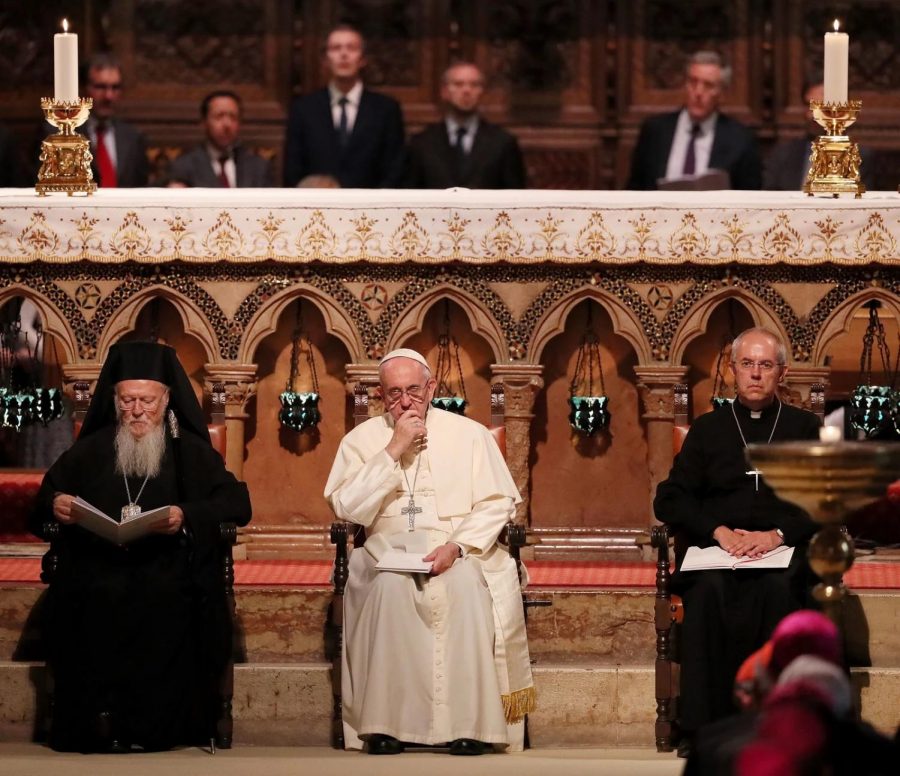Fordham Must Act on Climate Change After Christian Leaders’ Message
The United Nations is hosting their Climate Change Conference of the Parties, or COP26, this November. This conference has been described as the “the world’s best last chance to get runaway climate change under control.” A primary goal of the 26th annual conference will be to comprehend the effects of the Paris Agreement of 2015, which was settled upon almost unanimously by the participating countries of the COP21. The Paris Agreement was legally binding in order to hold all those involved accountable for reducing their country’s emissions while giving them the individual freedom to choose how to execute.
The COP26 has other goals they would like to achieve: securing global net zero by mid-century and keeping 1.5 degrees within reach, adapting to protect communities and natural habitats, mobilizing finance and working as a unit to deliver on these objectives.
This conference is also notable due to some additions to the guest list – the three top Christian leaders issued a joint-statement displaying the commitment they have to their communities for the first time in history.
The message reads: “[As] leaders of our Churches, we call on everyone, whatever their belief or worldview, to endeavour to listen to the cry of the earth and of people who are poor, examining their behaviour and pledging meaningful sacrifices for the sake of the earth which God has given us.” Pope Francis, Ecumenical Bishop Bartholomew and the Archbishop of Canterbury uniting in this statement is powerful and brings the gravity of our climate crisis into a soul-stirring focus.
While all three of these Christian leaders previously made environmental justice an important pillar of their faith, this new rhetoric welcomed further discourse. Still, religious institutions’ support of social issues such as climate change has rarely led to direct policy change.
President Joe Biden, a practicing Catholic, has acknowledged the importance of support from religious leaders such as Pope Francis and his call to action in regards to climate change. Nonetheless, there has not yet been any legislation written in the name of his faith. While advocacy by religious leaders is important because it demonstrates the significance of an issue in society, the influence is indirect.
The landmark recognition of these dire issues by the top three Christian leaders helped promote the United Nations’ COP26 conference. It piqued interest surrounding the goals of the COP26 and emphasized the importance of our planet’s future.
Religion undoubtedly plays a large role in every society. Emphasizing the importance of certain issues such as climate change in the name of faith can motivate community-led change. This direct call from Christian leaders encourages followers to align their moral compasses with Christian ideologies, which include respect for the planet. This move can heighten many followers’ interests in climate change.
This is a call to respect the beauty of nature, which translates to a care for the divine creation of nature. The support of Christian leaders helps make the message at hand more comprehensible for religious followers. It also offers a larger perception of bipartisan support and further accentuates the harsh reality of climate change.
This religious support also places a responsibility on institutions and organizations affiliated with Christianity. Fordham, an institution run by Jesuits, directly falls under this umbrella. Fordham must acknowledge its environmental responsibility and continue to do so after this call to action.
The most recent publication by Fordham describing the university’s climate action was released in 2018. The report details the Jesuit mission, noting that “In keeping with the Jesuit traditions … the University recognizes the value of minimizing its environmental impact and endeavors to pursue best practices throughout all aspects of its activities.” The report shows changes made to Fordham’s campuses to operate more sustainably.
While there have been positive shifts to cleaner energy sources – such as adding solar panels to Walsh Library and the conversion to electric or biofuel vehicles – administration still lacks a sense of urgency.
There have not been any further reports from the University since the 2018 plan, nor has there been any recent data about the university’s progress or upcoming initiatives.
While there are multiple student groups on campus devoted to sustainability and eco-consciousness, support and partnership from Fordham’s leaders are crucial elements to enacting any sort of lasting change.
Despite their efforts, it seems as though the best that the leaders’ call to action can do is boost morale.
However, as a Jesuit university, these Christian ideas should lead to a more passionate and active system to combat climate change and promote sustainable practices on Fordham campuses, as well as around the world.
Michela Fahy, FCRH ’23, is a humanitarian studies and English major from Cedar Grove, N.J.








































































































































































































